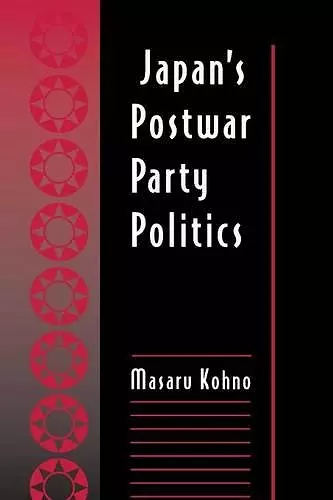Japan's Postwar Party Politics
Format:Paperback
Publisher:Princeton University Press
Published:25th Feb '97
Currently unavailable, and unfortunately no date known when it will be back

This is a major contribution to the field. Its application of rational choice approaches to Japanese politics raises the level of discussion. The author avoids many of the pitfalls of the rational choice approach and provides a significant improvement over previous analyses. The book is also the best single source in English on the history of the early postwar period and the details of internal party politics in Japan. -- Steven R. Reed, Chuo University (Tokyo) One of the most interesting and convincing rational-choice treatments I have read on any subject. Kohno's work is appropriately embedded in history yet it has exquisite analyses of strategies pursued by parties, factions, and individual politicians. It rates high marks for accessibility, cogency, clarity, and parsimony. -- David R. Mayhew, Yale University
Presents a systematic reexamination of the evolution of party politics in Japan since the end of the second World War. This study provides a set of interpretations based on a microanalytic approach that highlights the incentive and bargaining power of individual political actors, and their competitive and strategic behavior.In this sophisticated theoretical work, Masaru Kohno presents a systematic reexamination of the evolution of party politics in Japan since the end of the second World War. Because of the long one-party dominance by the Liberal Democratic Party, Japan's parliamentary democracy has often been viewed as unique in the developed world, and most of the existing studies of Japanese party politics have addressed such determinants as its political culture, historical background, and socio-ideological cleavages. According to the author, these explanations do not adequately account for some of the most important changes that took place in Japanese party politics during the postwar period. This study advances an alternative set of interpretations based on a microanalytic approach that highlights the incentive and bargaining power of individual political actors, and their competitive and strategic behavior under existing institutional constraints. According to Kohno, the evolution of political life in postwar Japan depends on the same factors that are acknowledged to be at work in other industrialized nations. He reveals, through detailed case studies of government formation processes and statistical examinations of candidate nomination patterns, that the microanalytic approach can establish forward-looking and internally consistent interpretations of the postwar development of Japanese party politics. Because Japan has usually been treated as a country of unique cultural, historical, and societal characteristics, the analyses of this study point to the broader applicability of the microanalytic approach in the field of comparative politics, especially for the exploration of party competition in advanced industrial democracies.
"Kohno's approach generates answers to questions that conventional interpretations fail to provide... Unlike so many other studies that implicitly or explicitly assume that the Japanese case is unique, the study offers fertile grounds for comparison 'with political parties and competitive party systems in other advanced countries.'"--Japan Quarterly "Kohno has produced a cogent microanalysis of post-1945 party politics in Japan... An informative re-creation of the political environment in which party leaders interacted and significant insight into the decision-making process that logically followed."--Choice
ISBN: 9780691015965
Dimensions: unknown
Weight: 28g
172 pages